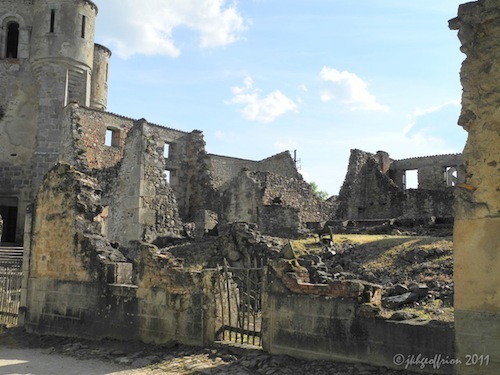
Ruins of Oradour-sur-Glâne, France
On June 10, 1944, just a few days after the Allied invasion at Normandy, 200 German S.S. troops surrounded a little French village, Oradour-sur-Glane. By nightfall, all but three escapees and a half a dozen others had been massacred. Six hundred and forty-two men, women and children dead.
Some say the Germans mistook this village for another with a similar name, another Oradour whose Resistance fighters, the machi, had abducted an S.S. officer earlier in the week. At the official memorial site, interpreters believe the attack was likely ordered as part of Himmler's ongoing campaign of terror. Whatever the precise reason for the massacre, the killings were brutal, cruel and unconscionable.
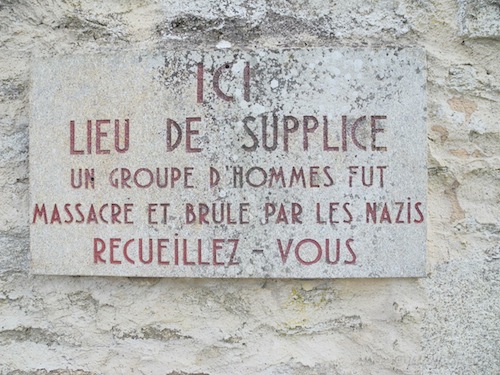
"Here, in this place of torture, a group of human beings were massacred and burned by the Nazis. Thoughtfully meditate on these things."
My wife and I silently drifted from ruin to ruin in the half razed village, preserved as a memorial. As I wandered by the school, the church and what remained of the little shops in the center of the village, I imagined the scene just hours before the soldiers arrived. Cafés were selling coffee. Coiffeurs were cutting hair. Men and women were working in the fields or selling their products in town. The children were running up and down the street, some helping their parents, others just enjoying summer vacation.
By evening, nearly all these precious lives were reduced to smoldering, bullet-ridden corpses. Dead or alive, everyone in the village was eventually doused with gasoline and set afire. Fewer than 10 percent of the bodies were identifiable after the German soldiers had finished executing their orders.
I thought it odd that I felt almost nothing for almost two hours, until I realized that I simply couldn't believe what I was reading and seeing. I was in shock and couldn't take in the horror of it all.
It's not as if I didn't already know about the millions who had died in concentration camps and gas chambers, the pogroms conducted over the centuries and the even more horrific genocides in Rwanda, Armenia, Bosnia, Cambodia and elsewhere. Maybe it was the senseless, cold-blooded brutality against innocent villagers that so disturbed me this time. Maybe it was the realization that the killers looked just like me, and their victims just like the people in my own family. Or, maybe it was a growing sense of terror that what happened in this little village less than a century ago could happen again, anywhere, given the right conditions. And probably would again and again and again.
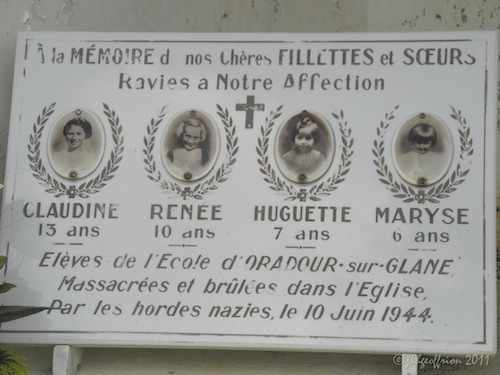
The tears finally began falling when I read the inscriptions on the memorial stones in the cemetery. Many spoke of loved ones whose lives were senselessly cut short by the "barbarian Germans." The one pictured above reads: "To the memory of our dear little girls and sisters, charmed with our affection ... students of the school at Oradour-sur-Glane, massacred and burned in the church by the Nazi hordes..."
My grief soon gave away to rage, and I began fantasizing wreaking revenge on the perpetrators and anyone else like them. And then it struck me.
Violent instincts aren't reserved for tyrants, psychopaths, soldiers or citizens just following orders, and neither are destructive actions. Genocide is an extreme expression of a type of human behavior that is way too normal.
Don't fool yourself. While (fortunately) most of us do not act on our irrational, most violent impulses, none of us is innocent. Any of us is capable of treating others cruelly and even violently, given the right circumstances. Each of us knows how to hurt others. Each of us has done so, and keep doing so, in one way or another all of our lives.
Our heartless judgments, our unwillingness to forgive, our spineless fear of going against those in power, our preoccupation with our own comfort and gratification, our inability or unwillingness to empathize, or simply our indifference -- all set the stage for inflicting damage on others, by design or neglect. Each of us is perpetuating a world of violence far more than we sometimes realize. And in our blindness, we may be unwittingly missing opportunities to stop the flow of hatred that leads to the destruction of innocent lives.
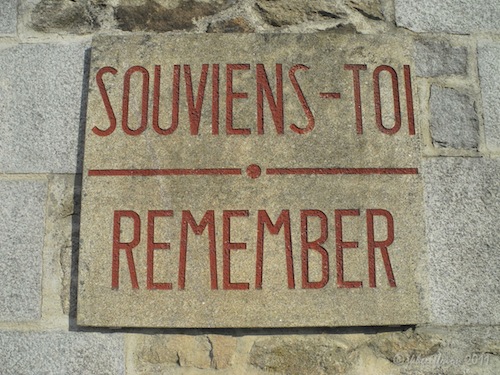
At the entrance to the ruins there's a sign that reads, "Souviens-Toi--Remember." It's an ominous warning: Remember what happened, and realize it can happen again.
As a human race, we must anticipate that some day the perfect storm of circumstances -- some combination of hatred, fear, ignorance, prejudice, rage, political expediency, malicious propaganda, unchecked power, lack of accountability or some other trigger -- will suddenly unleash another genocide somewhere in the world. We don't know when, but it's coming. We need to get ahead of it, and do all we can to diffuse these destructive forces wherever and whenever we can.
As individuals, we must look within ourselves, too. The lesson of Oradour-sur-Glane for most of us is not, "Don't commit genocide," as if anyone had to hold us back from wholesale murder. No, the horrors of such unimaginable atrocities say to me: Don't just weep for the victims or rage against the perpetrators. Think about how you are contributing to the violence in the world, and where such treatment of others leads.
Look in the mirror.
Remember.
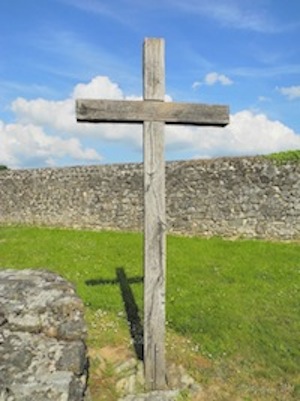
Memorial site where victims were drowned.
A Prayer for Help
"Merciful God, save us from ourselves. Please break our hearts over our own hatred, desires for revenge, violent words, hurtful actions, indifference and neglect. Forgive us for all we do to contribute to the suffering of the world, and help us to forgive all those who have neglected, abandoned and abused us. Help us to resist the temptation to strike out against others, and deliver us from the evil that too easily surfaces within us. Lead us to your well of grace and love that we may drink from it, be cleansed and be empowered to think and live differently. Amen."
This article is a rewrite of an earlier version posted on the author's blog.